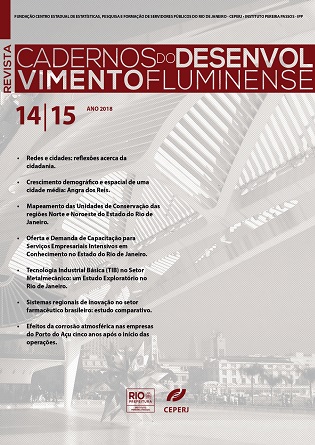Supply and demand factors of work-related training for Knowledge Intensive Business Services in the Rio de Janeiro State, Brazil
DOI:
https://doi.org/10.12957/cdf.2018.47676Abstract
Knowledge Intensive Business Services (KIBS) involve activities that have the purpose of creating, appropriating or disseminating knowledge, and may be important for value generation, due to their innovative potential. This article has the main purpose of diagnosing which Knowledge Intensive Business Services are located in which regions of the State of Rio de Janeiro (SRJ) and whether these regions offer courses to provide training in these services. Furthermore, this article will analyze how these conditions affect the possibilities of development of innovation. The research methodology of this article was structured in five steps: 1) bibliographic review on KIBS through research in the Portal of CAPES Journals; 2) selection of the most important segments of these services for the State of Rio de Janeiro using the National Classification of Economic Activities (CNAE / IBGE); 3) Calculations of each of these segments using Locational Quotients of all the municipalities of the State, in order to identify demands for capacity building; 4) Mapping of training courses in technical, higher and postgraduate education for segments that were relevant in the State; 5) cross-reference between supply and demand to identify potential of development of these services in the SRJ. The results suggest that a large part of the supply and demand of training by KIBS in the SRJ is concentrated in its metropolitan region, which imposes limitations to the contribution of these services to development of innovation in other areas.Downloads
Published
How to Cite
Issue
Section
License
Os Direitos Autorais dos artigos publicados na revista Cadernos do Desenvolvimento Fluminense pertencem ao(s) seu(s) respectivo(s) autor(es), com os direitos de primeira publicação cedidos à Cadernos do Desenvolvimento Fluminense, com o trabalho simultaneamente licenciado sob uma Licença Creative Commons Atribuição, a qual permite o compartilhamento do trabalho com reconhecimento da autoria e publicação inicial nesta revista.
O(s) autor(es) tem/têm autorização para assumir contratos adicionais separadamente, para distribuição não-exclusiva da versão do trabalho publicada nesta revista (ex.: publicar em repositório institucional ou como capítulo de livro), com reconhecimento de autoria e publicação inicial nesta revista.
Autores têm permissão e são estimulados a publicar e distribuir seu trabalho online (ex.: em repositórios institucionais ou na sua página pessoal) a qualquer ponto antes ou durante o processo editorial, já que isso pode gerar alterações produtivas, bem como aumentar o impacto e a citação do trabalho publicado.

A revista Cadernos do Desenvolvimento Fluminense está licenciada com uma Licença Creative Commons Atribuição 4.0 Internacional.




